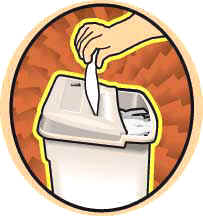|
Is Someone Cloning Your Identity?
How Can I Minimize My Risk?
You can minimize your risk of identity theft by taking some precautions
when handling or revealing your personal information.
- Dont reveal personal identifying information unless you
know how it will be used and whether it will be shared with others.
Determine whether you have a choice about how your information
is used; can you keep it confidential?
- Pay attention when you receive your bills. If a bill
doesnt arrive, check with the creditor to find out why. A missing
bill could mean a thief has appropriated your account and changed
the billing address, so youre not receiving a bill anymore.
- Protect your mail. Deposit outgoing mail in postal service
collection boxes or at the post office. Dont let mail linger
in your mailbox; remove it promptly after delivery.
- Place passwords on your credit card, bank and telephone accounts.
Dont use easily obtainable information, such as your mothers
maiden name, your birth date, the last four digits of your Social
Security number or phone number, or a series of consecutive numbers.
- Carry only the minimum amount of identification and cards
you actually need each day.
- Dont reveal personal information on the phone, through the
mail or over the Internet, unless you initiated the contact or
are absolutely sure with whom you are dealing. Thieves pose
as bank employees, Internet service providers, solicitors for
charities, utility telemarketers and government officials to persuade
you to reveal your personal identifying information. Remember,
legitimate organizations with which you do business already have
the information and wont ask you for it. Others should be willing
to send you written solicitations.
- Tear or shred charge receipts, copies of credit applications,
 insurance forms, bank checks and statements you are discarding,
expired charge cards, and credit offers you receive in the mail.
insurance forms, bank checks and statements you are discarding,
expired charge cards, and credit offers you receive in the mail.
- Dont leave items containing personal information lying around
your home, especially if you have roommates, employ domestic
help or when you have service work done in your home.
- Ask who in your workplace has access to your personal information.
Be sure the records are kept in a secure location.
- Only reveal your Social Security number when absolutely necessary,
and dont carry your Social Security card. Ask to use other
identifiers, if possible.
- Every year, obtain copies of your credit report from each
major credit-reporting agency. Verify the accuracy of each
report, and that each one includes only those activities youve
authorized.

|
HOW TO CONTACT
THE CREDIT BUREAUS
Equifaxwww.equifax.com
To order a credit report: 800-685-1111
To report fraud: 800-525-6285
Experianwww.experian.com
To order a credit report: 888-397-3742
To report fraud: 888-397-3742
Trans Unionwww.tuc.com
To order a credit report: 800-916-8800
To report fraud: 800-680-7289 |
